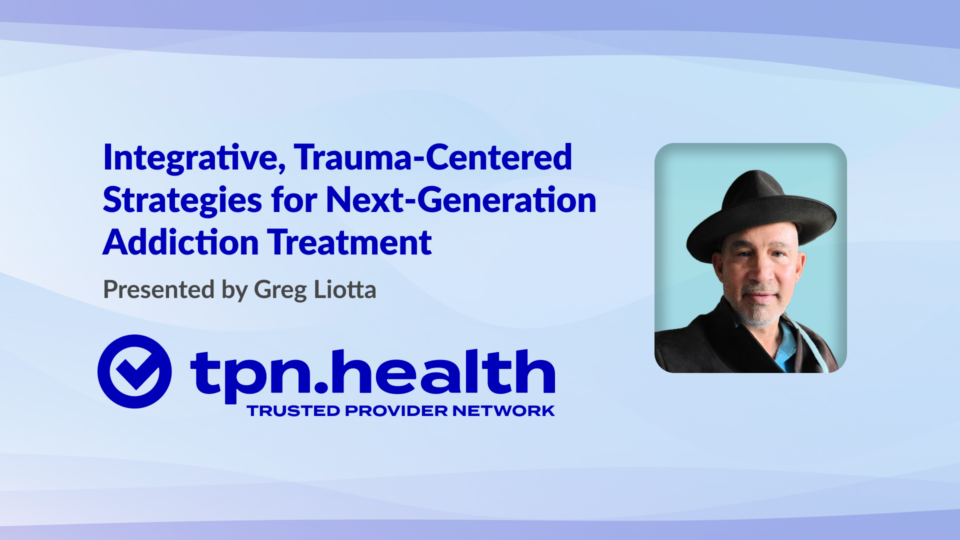Module 3: A Compassionate Lens: Polyvagal Applications for Addiction Treatment

Module 3: A Compassionate Lens: Polyvagal Applications for Addiction Treatment

Presented By
Dates and Times
-
-Live Webinar
Location
-
Live WebinarAccess virtually on TPN.health
In this module, we explore the life of the Autonomic Nervous System (ANS) and its relationship to the brain and body. We also explore the relevance of vagus nerve activity in addressing addictive behaviors. Participants will gain a comprehensive view of Polyvagal Theory as it relates to treating trauma and compulsive habits of self-soothing, as well as practical strategies for implementing polyvagal, felt-sense interventions.
- • Counselors
- • Substance Use Disorder Professionals
- • Social Workers
- • Licensed Marriage and Family Therapists
The educational goal of this workshop is to increase knowledge about polyvagal applications for addiction treatment.
At the end of this course, participants will be able to:
-
Describe the physiology of the Vagus Nerve system and its relationship to the brain.
-
Identify one way breathing patterns and sound influence the nervous system.
-
Demonstrate at least 2 HeartMath breathing practices that regulate the nervous system.
-
List 2 new contributions from Winhall's Felt-Sense model for treating addiction.
-
Describe Global High Intensity Activation and list 2 ways to assess for it.
-
Identify one way to assess when a client is in: (1) Ventral autonomic state (2) Sympathetic autonomic state, and (3) Dorsal autonomic state
-
Identify 2 ways to effectively help clients access the Ventral/Social Engagement.
-
Identify 2 ways clinicians can integrate sound as a healing modality.
-
Dana, D.A. (2023) Polyvagal Practices: Anchoring the Self in Safety. Norton.
-
Dana, D.A. (2018). The Polyvagal Theory in Therapy: Engaging the Rhythm of Regulation. Norton.
-
Deb Dana (2020). Polyvagal Exercises for Safety and Connection: 50 Client-Centered Practices. Norton.
-
Dana, D.A. (2020). The Polyvagal Flipchart: Understanding the Science of Safety. Norton.
-
Kurtz, R. (1990) Body-Centered Psychotherapy: The Hakomi Method - The Integrated Use of Mindfulness, Nonviolence, and the Body. Liferhythm.
-
Kurtz, R. and Prestera, H. (1984). The Body Reveals What Your Body Says About You. Harper Collins.
-
Porges, S. (2017). The pocket guide to the Polyvagal Theory: the transformative power of feeling safe. Norton.
-
Porges, S. Dana, D. (2018). Clinical applications of the polyvagal theory. Norton.
TPN.health has been approved by NBCC as an Approved Continuing Education Provider, ACEP No. 7267. Programs that do not qualify for NBCC credit are clearly identified. TPN.health is solely responsible for all aspects of the programs.
Course meets the qualifications for hours of continuing education credit for LPCCs as required by the California Board of Behavioral Sciences. TPN.health is approved by the California Association of Marriage and Family Therapists to sponsor continuing education for LPCCs. TPN.health maintains responsibility for this program/course and its content.
Trusted Provider Network, LLC is recognized by the New York State Education Department’s State Board for Mental Health Practitioners as an approved provider of continuing education for licensed mental health counselors. #MHC-0220.
This course has been approved by TPN.health, as a NAADAC Approved Education Provider, for educational credits. NAADAC Provider #198061, TPN.health is responsible for all aspects of the programming. Counselor Skill Group: Legal, Ethical and Professional Development.
TPN.health, #1766, is approved to offer social work continuing education by the Association of Social Work Boards (ASWB) Approved Continuing Education (ACE) program. Organizations, not individual courses, are approved as ACE providers. State and provincial regulatory boards have the final authority to determine whether an individual course may be accepted for continuing education credit. TPN.health maintains responsibility for this course. ACE provider approval period: 03/31/2022 – 03/31/2025. Social workers completing this course receive 1.5 continuing education credits.
Course meets the qualifications for hours of continuing education credit for LCSWs as required by the California Board of Behavioral Sciences. TPN.health is approved by the California Association of Marriage and Family Therapists to sponsor continuing education for LCSWs. TPN.health maintains responsibility for this program/course and its content.
Trusted Provider Network, LLC is recognized by the New York State Education Department’s State Board for Social Work as an approved provider of continuing education for licensed social workers #SW-0654.
Course meets the qualifications for hours of continuing education credit for LCSWs as required by the California Board of Behavioral Sciences. TPN.health is approved by the California Association of Marriage and Family Therapists to sponsor continuing education for LMFTs. TPN.health maintains responsibility for this program/course and its content.
Trusted Provider Network, LLC is recognized by the New York State Education Department’s State Board for Mental Health Practitioners as an approved provider of continuing education for licensed marriage and family therapists #MFT-0097.
-
Waiting Room Opens
-
Workshop Begins
-
Workshop Ends

